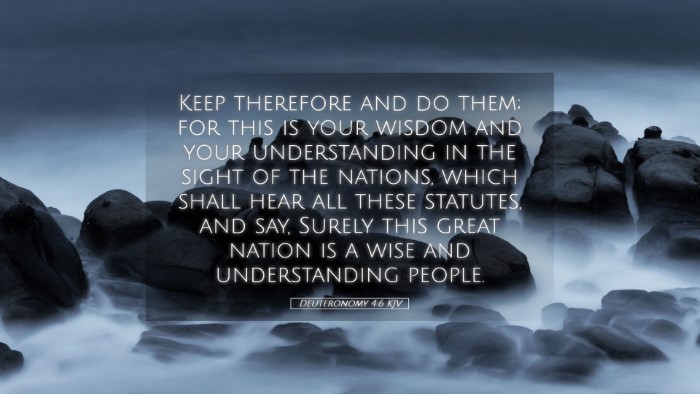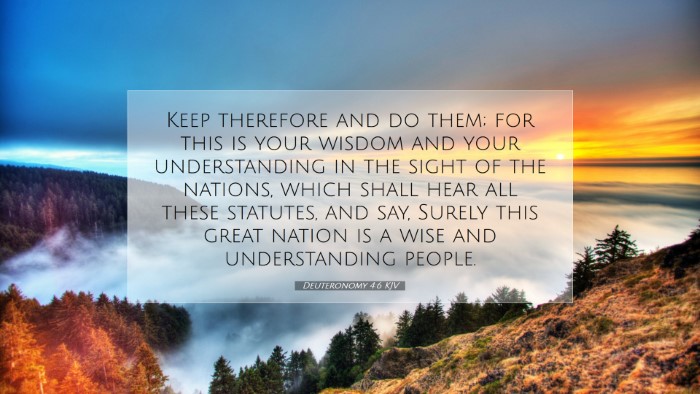Commentary on Deuteronomy 4:6
Deuteronomy 4:6 states, "Keep therefore and do them; for this is your wisdom and your understanding in the sight of the nations, which shall hear all these statutes, and say, Surely this great nation is a wise and understanding people." This verse is pivotal in understanding the relationship between obedience to God's commandments and the witness of Israel among the nations. The commentaries by Matthew Henry, Albert Barnes, and Adam Clarke provide a comprehensive examination of this important scripture.
Context and Significance
The context of Deuteronomy is vital for interpreting this verse accurately. This book serves as a series of speeches by Moses to the Israelites as they prepare to enter the Promised Land. After forty years of wandering in the desert, Moses emphasizes the importance of adhering to God's laws. In this setting, the commands are not merely regulatory but are framed as a means to ensure the nation's welfare and divine favor.
Wisdom and Understanding
The phrase "this is your wisdom and your understanding" highlights the intrinsic value of God's laws. Matthew Henry notes that obeying God's commandments will not only lead to spiritual enrichment but will also result in a moral and ethical framework that is recognizable to the nations surrounding Israel. Albert Barnes adds that the knowledge derived from observing these statutes would elevate Israel’s reputation, setting them apart as a nation reflective of divine wisdom.
The Nature of God's Laws
-
Divine Origin: Henry emphasizes that these laws are divinely instituted, a direct reflection of God’s character and His will for humanity. The adherence to such laws manifests wisdom that resonates beyond the borders of Israel.
-
Practical Application: Clarke notes that the focus on doing these statutes indicates a practical application of faith. The laws embodied not only ethical directives but also fostered social harmony and justice.
The Role of Witness
The latter part of the verse, "which shall hear all these statutes," emphasizes the missional aspect of Israel’s adherence to the law. As nations observe the moral and ethical conduct of Israel, their attention is drawn toward the God of Israel. Henry points out that such a witness serves to declare the glory and righteousness of God before all nations.
Cultural Implications
-
Societal Respect: Barnes posits that as nations witness the justice and order within Israel, they will gain respect for their way of life, prompting them to examine the God that inspired such statutes.
-
Evangelistic Impact: Clarke elaborates that the observance of God’s commandments serves not only as a covenant with Israel but also as an invitation for the nations to inquire and engage with the God of Israel, thus expanding the reach of His covenant love and truth.
Faith and Obedience
The directive to "keep" and "do" indicates an active engagement with God's commandments. Matthew Henry remarks that faith without works is dead; thus, obedience is the fruit of genuine faith. The emphasis here is not just on intellectual assent but on a holistic commitment to live out God’s statutes in real-life situations.
Theological Reflections
-
Integration of Faith and Practice: As Barnes asserts, true understanding comes from the practice of faith. The laws are not burdensome but are designed for the well-being and flourishing of God’s people.
-
Witness of the Community: Clarke highlights the communal aspect of faith, suggesting that the collective adherence of the community serves as a powerful testament to the nations, reinforcing that obedience is observed and leads to societal transformation.
Conclusion
Deuteronomy 4:6 serves as a strong reminder of the intertwining relationship between obedience to God’s commandments and the representation of God’s wisdom before the nations. The insights gleaned from public domain commentaries illustrate that the instruction is not only a guide for individual conduct but a collective mission for Israel to embody the character of God. For pastors, students, theologians, and scholars, this verse encapsulates the call to integrate faith into every facet of life, thereby becoming the embodiment of divine wisdom and understanding to the world.


